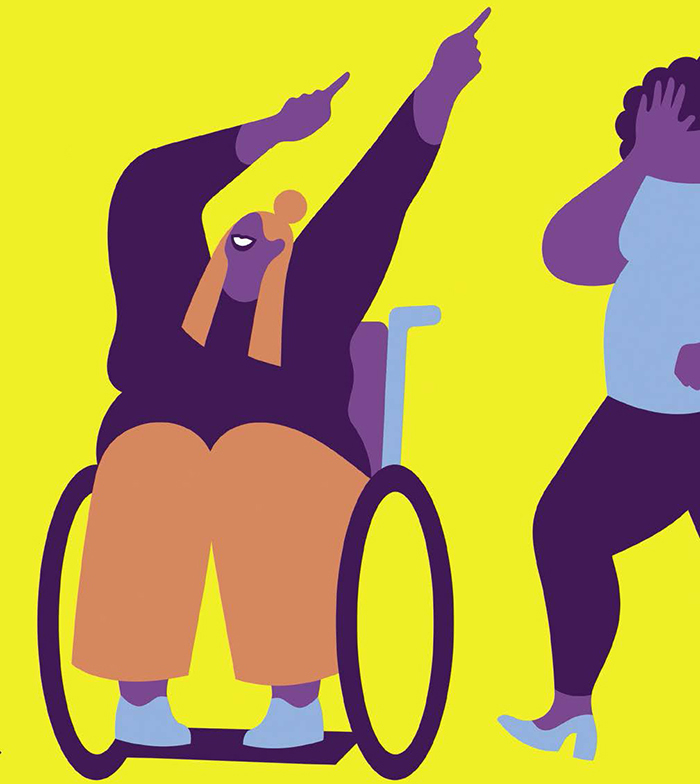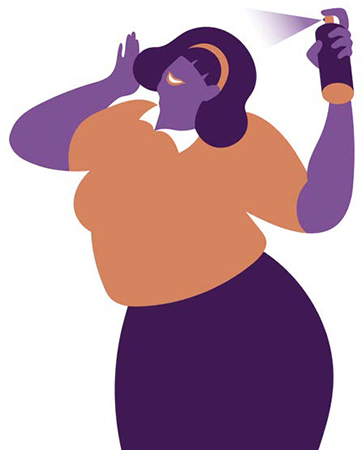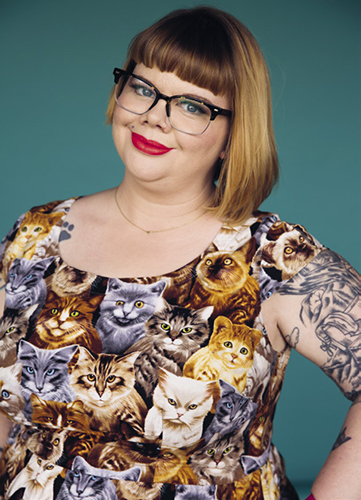
Baltimore . . . and Me
The thing about being fat is that—at least for me and the fat people in my life—it never seemed to match what I heard about fat people. Fat people I knew were smart, interesting, passionate, and a thousand other qualities that couldn’t be traced back to any fat joke I’d ever been told. They were athletic . . . or not. Happily relationshipped . . . or not. Highly educated . . . or not. In other words, they represented a vast and diverse human experience, just like everyone else. So, if the stereotypes about laziness and stupidity didn’t line up with my real-life experience, where was this even coming from?
I wish there was a simple pathway from the origin of fatphobia to its often-devastating results, so that fat people and allies could home in on it and easily burst it apart with knowledge and empathy. Look, I’m the author of books about cute teens having swoony experiences, not a social scientist, so I realize a discussion regarding fatphobia in modern culture and its various root causes and effects are beyond my capabilities. I’m so glad those conversations are happening; I’m constantly grateful for anyone embarking on fat studies, and for all the fat activists who’ve gotten people to see this is something worth taking seriously.
But I don’t think it takes a social scientist to understand where misunderstanding, stereotypes, and even downright hate are coming from. Just the experience of living as a fat person teaches you quite a bit about why the world sees us the way that it does. And something that’s hard not to learn? As far as pop culture goes, we might as well not exist.
Of course, I’ve often thought that not existing in media sounded great in comparison to the representations of fat people I was used to. The one I think of the most is that crowd footage of headless fat people frequently used by local news stations to talk about stories ranging from so-called obesity epidemics to cholesterol medicine updates. There was never a camera angle that included any faces; these headless fats let you know the only thing worse than being fat was having the public know you were fat. Who were we supposed to think these fat bodies were attached to? Where were the headless fats going? What did the release form say when a cameraman pointed the lens at them? I guess none of this mattered to anyone, because if you don’t think of fat people as fully three-dimensional humans, what does it matter? Three-dimensional people typically have heads, after all, and clearly these fats didn’t. It sure is easy to reduce people to stereotypes when you dehumanize them entirely.
For the record, all the fat people I’m lucky enough to know have heads.
Yeah, yeah, that’s just B-roll footage on nightly news stories; and who even watches the local news these days, am I right? But in scripted entertainment, I never felt like fat people fared any better. Maybe worse! At least the headless fats looked like they had somewhere to go and other fat people to walk, if not talk, with. Hopefully they had a support group. Hopefully that footage was captured on their way to the coolest party ever.
Fat characters on TV and in movies didn’t get to go to cool parties, unless it was purely as a vehicle to spoil the fun for the main—always thin—characters. Fat characters never seemed to understand how much space they took up, frequently knocking over valuable, fragile items—or even other people. Never mind that I and every other single fat person I knew took incredible care to take up as little space as possible and stay away from restrictive areas. Fictional fat people were always showing up where they weren’t wanted, like termites or one of those springy snakes that pops out of a can bearing the label mixed nuts, with no regard for the feelings of the poor, innocent thin people who might have to suffer a tragedy as great as having to interact with a fat person. Can you imagine?
I’d love to say that this didn’t get to me, that the drastic difference between my real life as a fat person with friends I loved and a job I loved and a whole inner world that I—well, liked enough, was striking enough that I could just disregard fictional fats. But I’d be lying, because I hated every single part of this. I hated seeing bodies like mine used as fear-baiting. I hated being in a movie theater and realizing I was surrounded by people who laughed uproariously at the image of fat people being stupid, inconsiderate, and somehow incapable of understanding basic human physics like what kind of chairs one’s butt could feasibly fit into.
For the record, I always know what kind of chairs my butt can fit into.
Even when a piece of pop culture happened to feature a fat person with a fully-developed inner life and a not-terrible outer life—progress!—their weight was, nearly without fail, presented as something they were unhappy with, something that they actively hated about themselves. The people who looked like me . . . hated that about themselves. And no matter what your own life looks like and how relatively healthy your self-esteem might be, it was a pretty terrible feeling.
It can wear you down to be consistently shown that loving yourself isn’t an option. In the mirror and around my loved ones, I felt fine. Our culture isn’t necessarily kind to women and their appearance in general, but most of the time that’s about where I hovered—not much higher or lower than women of any given size. I’d have concerns about my hair or if this denim wash was too last season, but I didn’t often step out of the house and worry about my size.
My size was a neutral thing on its own, until it wasn’t. Because seeing a woman my same size as some sort of problem to be solved didn’t keep my self-esteem at that hovering level. Was everyone thinking that about me? The friends, family, coworkers I’d felt comfortable and safe with—was that a lie? And if all these people I respected might secretly think I was only some “before,” some problem to solve . . . was I? Deep down, I knew I had value, just as I was. But there were days when it was tough remembering that.
By the time the musical version of Hairspray was released as a film, I’d already seen the show on Broadway. I was fortunate enough to attend on a night less than one week out from the show’s Tony wins, and so it felt both historic and inspiring to watch Marissa Jaret Winokur as the fat lead character, Tracy Turnblad. But the stage has always been its own thing to me. Since I was young, theater had space for characters of all colors in ways I wasn’t necessarily seeing in mainstream film or television. The stage had roles for actresses over thirty, forty, fifty, and beyond. The stage gave us complex queer characters. And so, while I loved seeing Tracy fight not only for her own representation but in the much larger battle to desegregate early-1960s television, it didn’t seem to bring us any closer to better representations of fat people in the media. After all, the musical was based on a movie from 1988. Things hadn’t gotten magically better then. I hardly thought a Broadway musical seen by fewer people could get us there.
Then the Hairspray musical movie happened.
I’ll begin with a blanket caveat that the movie is far from perfect. Stage to screen adaptations are always tricky, and I’m not the biggest fan of every cast member’s performance. But, oh my god, how I love this movie anyway.
When Nikki Blonsky appears on-screen in the film’s opening song, “Good Morning, Baltimore,” I could hardly believe it. This wasn’t an actress who weighed a few more pounds than the average female movie star. This was an actress whose body took up space in the same way mine did. But Tracy wasn’t a punch line, and Tracy wasn’t a joke. It was an exuberant paean from Tracy to her hometown of Baltimore, the city she loved and that clearly loved her right back. It was also a love letter to herself, her talents, and her own ambitions. This wasn’t just a fat girl existing; this fat girl took joy in her skills. This fat girl was determined to get what she wanted.
Also, Tracy looked great. It wasn’t what struck me most, though, about her appearance. Nope, that was how Blonsky embodied a girl who loved herself. There’s a pride and a confidence Tracy takes in just those few moments of getting ready for school that told me everything I needed to know. Tracy was the film’s heroine, and she wasn’t supposed to hate herself like those ding-dongs in bad comedies whose self-love is seen more like self-delusion. Here was a girl built a whole lot like me, and she was the centerpiece of a movie that loved her and saw her story as valuable.
Tracy also wasn’t, you know, just fat. In fact, just like me, most of her inner world revolved around completely unrelated things. Tracy loved to dance and was incredible at dancing. Tracy loved her friends, old and new, loudly and wholeheartedly. Tracy saw injustice in the world and realized that no matter what she got to achieve as a fat white girl, racism was an insidious hatred that had to be fought. And, sometimes most of all, Tracy daydreamed about ending up with Link Larkin, who wasn’t a bore the fat girl had to settle for, but the cutest boy in all of Baltimore.
Once Tracy achieves her dream of dancing on the Corny Collins Show, Tracy and her mom, Edna, are given the opportunity to outfit themselves at Mr. Pinky’s plus-size boutique, Hefty Hideaway. For basically my entire life, fashion magazines told me that the most “flattering” way for fat women to dress was to “minimize” their size. Silhouettes should be draped, and colors should be dark, almost like you could blend into some black curtains and disappear. Yet the outfits Tracy and Edna receive from Hefty Hideaway are the opposite of subtle in silhouette and color. Zebra print! Glitter! Fringe! Sometimes all at once. If anything, size and curves are emphasized, because it turns out if you don’t equate bigger measurements with moral failure, ugliness, or worse, there’s no reason to pretend you’re smaller.

I remember how I felt the first time I walked into a Torrid or the time period where ModCloth finally started carrying sizes above XL. I gave up wearing only some version of dark jeans with blouses that swooshed over me for candy-colored, twee-patterned A-line and fit-and-flare dresses that did absolutely nothing to make me look smaller. I wasn’t small, and no number of drab patterns were going to change that. I might as well dress how I wanted, regardless. And there’s something about looking loud and in charge of your own look that can say a lot to the world, because unfortunately it’s still revolutionary to be fat and not hate yourself in public. When you wear something that won’t “disappear” you into a dark curtain, even if it isn’t covered in glitter or fringe, people get the message, subtle or otherwise, that you think you’re someone worth seeing.
Tracy also—spoiler alert, for a twelve-year-old movie based on a thirty-one-year-old movie—gets the boy! She gets him as she is, and when he’s weak-willed in the face of the powers that be, Tracy knows equality and her values matter way more than any cute boy with extremely good hair. But Baltimore’s dreamy Link Larkin’s no fool; he recognizes that Tracy and her beliefs are worth taking a stand for, and so it’s a romance where the handsome-as-hell boy has to improve himself to deserve our heroine. Our fat heroine.
Look, I didn’t only start wearing louder dresses because of Tracy and Hairspray. A lot of my love for Tracy was due to our existing similarities. I had always known I had a rich inner life—and no one who knows me would be surprised to hear I think Link Larkin’s portrayer, Zac Efron, is super dreamy, especially back when he was singing and dancing all the goshdarn time. Friendship and family matter to me like they do to Tracy, and so does resistance. It wasn’t that I needed her in order to know that about myself. I knew, inside, that I was more than any hacky joke, more than a fat body without a head. But Tracy gave me a mirror, and, in a way, I needed that to see myself fully. As I said, self-esteem can be hard for anyone. Getting a reminder that you can trust how you see yourself can be life-altering.
And there were real-life role models, too! Reading Lindy West and Roxane Gay gave me power in words, in vocabulary about fatness I didn’t yet possess. Vocabulary can be a powerful weapon in the war against hating yourself. I still remember the first time that I referred to myself as fat to someone else and combatted their knee-jerk “Of course you’re not fat!” with the simple fact that I was, and there wasn’t anything wrong with that. In my day-to-day life I had in-person and text conversations with other fat women about our lives and our experiences. Connection is pretty powerful, too.
I still have a long way to go. When society still seems intent on letting fat people know how hated they are—if you don’t believe me, look at the comments on any high-profile fat person’s social media posts—I’m not immune. I take things to heart, and I feel crappy when a beautiful clothing item isn’t made in my size. When people don’t like me, even though I probably have dozens of actual bad qualities, I often assume it’s because of my weight. Sometimes I hate photos of myself—maybe more than sometimes, if I’m being honest.
I’d be lucky, honestly, to be Tracy Turnblad. Not because she kisses Zac Efron or help ends racial segregation on television in Baltimore. It’s because she believes that she deserves all the good things that happen to her. In fact, she fights for her spot on Corny Collins because she’s well aware she’s the best dancer. And it’s not due to naivete on her part; Tracy knows the world sees her a certain way because she’s fat, but it just doesn’t hold her back because—if I may steal a phrase from the show itself—you can’t stop the beat.
Pop culture didn’t embrace Tracy so hard that they immediately gave fat girls the leads in all the hot new movies and network dramas. Probably one reason, in fact, I still think about Tracy as often as I do is that she still seems as rare, precious, and valuable as one of the objects fat characters break with their butts in hacky comedies. I dream of a world where entertainment is full of fat people: fat people who save the day, and fat people who screw things up for reasons completely unrelated to their fatness. Fat people falling in love, fat people unleashing evil schemes. Fats of all colors, genders, sexualities.
I’ll always have Tracy, though, and the way I felt when I first saw her fatness on-screen. Maybe I’ll never achieve the highs she reaches before she’s even graduated high school, but representation in pop culture isn’t only about hard truths or realism. Skinny people get to save the day and kiss the beautiful one all the time at the end of movies! They get to stand in for the very best versions of regular skinny people. They get to be cheered on by the world.
For the record, Tracy Turnblad made me feel that the very best version of myself was someone other people could cheer for, too.

ROBYN VON SWANK
AMY SPALDING
grew up in St. Louis but now lives in the better weather of Los Angeles. She has a BA in Advertising and Marketing Communications from Webster University and an MA in Media Studies from the New School. Amy studied long-form improv at the Upright Citizens Brigade Theatre. By day, she manages the digital media team for an indie film advertising agency. By later day and night, Amy writes, performs, and pets as many cats as she can. She is the author of five young adult novels, including her latest, the bestselling The Summer of Jordi Perez (and the Best Burger in Los Angeles).